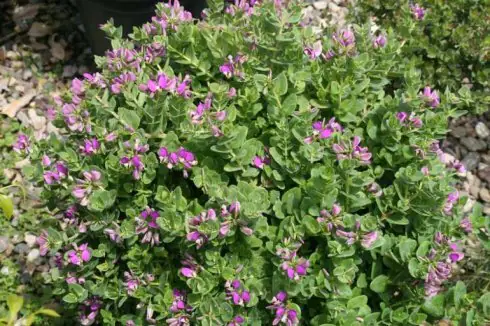

Secciones
Servicios
Destacamos

Denise Bush
Friday, 19 May 2017, 12:28
Polygala myrtifolia, commonly called the myrtle-leaf milkwort or September bush (La Lechera del Cabo in Spanish), is native to South Africa. It is a member of the Polygalaceae family (milkworts) which has 17 genera and approximately 950 species.
Polygala is a tough shrub; it can grow up to four metres tall in perfect conditions but is usually between 60cm and 1.80m high. The slender stems tend to grow upright and are covered with dense foliage. It can adapt to different soil and growing conditions which will result in a slightly different appearance of a plant grown on the coast to one grown inland or one grown in moist soil and one grown in arid conditions. The leaves can vary from needle thin to oval and range from 25 to 50mm long. Leaf colour can also vary from shades of green to soft grey.
The flowers look pea-like but close are quite different with deep veining and a brush like tuft. They are usually in shades of purple but there are white varieties such as P. myrtifolia White Feathers.
The small winged seed capsules disperse in the wind and may produce new plants close to the parent. Polygala can also be propagated by cuttings taken in the spring or the autumn.
Peak flowering period is in the spring, although Polygala will continue to flower on and off during the year. It is ideal as a windbreak or as a hedge and can also be grown in a large container. Although drought tolerant once established, it is best to water occasionally during the hottest months and a thick mulch around the base will help to conserve moisture.
The genus name comes from an old Greek word polys meaning much and gala meaning milk. This is probably because some members of the genus were fed to cows to stimulate milk production. Another use for the shrub, a practice that has long since died out, was to use the soft, grey bark frothed up in water to wash bodies before burial.
Publicidad
Publicidad
Publicidad
Publicidad
Esta funcionalidad es exclusiva para registrados.
Reporta un error en esta noticia

Debido a un error no hemos podido dar de alta tu suscripción.
Por favor, ponte en contacto con Atención al Cliente.

¡Bienvenido a SURINENGLISH!

Tu suscripción con Google se ha realizado correctamente, pero ya tenías otra suscripción activa en SURINENGLISH.
Déjanos tus datos y nos pondremos en contacto contigo para analizar tu caso

¡Tu suscripción con Google se ha realizado correctamente!
La compra se ha asociado al siguiente email
Comentar es una ventaja exclusiva para registrados
¿Ya eres registrado?
Inicia sesiónNecesitas ser suscriptor para poder votar.